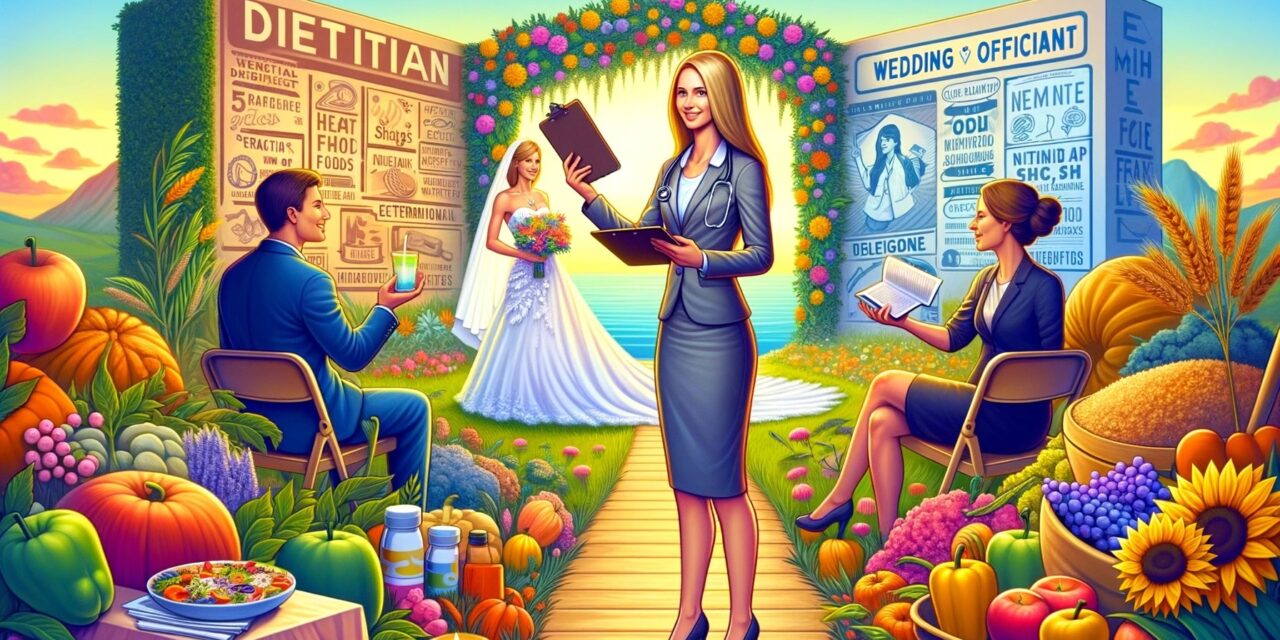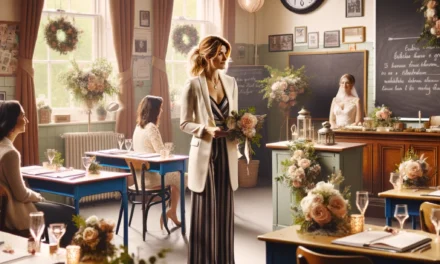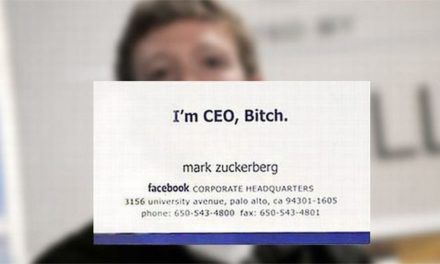In this episode of the Celebrant Talk Show, Josh Withers interviews Amy McNeilly, a recent graduate from the Celebrant Institute. Amy, who works as a clinical dietician, pursued celebrancy to engage more with people, inspired by a celebrant she admired.
The training was challenging, especially during the pandemic, taking two years to complete. She emphasises the role’s complexity and the importance of personalising ceremonies.
Her initial celebrant work began with friends’ weddings, and she plans to develop a more structured marketing strategy.
Transcription: G’day, welcome to another episode of the Celebrant Talk Show. My name is Josh Withers, I’m your host for today’s episode. And this podcast is produced by the Celebrant Institute, our website, celebrant.institute. We’re a membership program for celebrants to help you guys be the best you can be. Plus, we’ve got the Celebrant Institute RTO, where we train up new and aspiring celebrants with the qualification required to become a celebrant in Australia. And today you’re hearing another one of the series of our recent graduates talking to them about what it was like to do the course and of course become a celebrant. So please be inspired by today’s episode and hopefully you can take something away to make your celebrancy practice the best in the world. To find other episodes of the podcast, go to celebrant.fm and of course, for the full website membership, about the information about the search for a celebrancy, you can go to celebrant.institute.
My name’s Amy. I am from Melbourne, Victoria, and I first became a celebrant. I got qualified in July of 2021. – Why on earth did you become a celebrant? There’s a million jobs out there. You could have been a surgeon, a vet. Why did you become a celebrant? – Absolutely. Well, that’s a great question, Josh. Absolutely. I actually already have another career. So by weekday, generally I’m a clinical dietician, one of the major hospitals in Melbourne, but I’ve done that career for over a decade. And as happens, when you’re sent to become more senior in a career, you get to do less of the fun stuff and more of the boring stuff. So when I was a baby dietician, I used to do awesome things like run groups and take people to supermarkets and really get to know my clients or consumers or however we wanna put the people who use our services. But the more senior I became, the less I did that. And so I’m someone also who really loves people. So in terms of, I really like to know their story to the point that I have to stop myself from really delving into a really deep conversation with people on the first meeting or two. And so I was thinking about what puts my skills of loving people, getting to know their stories, but also having a bit more fun in a job. And it had been something I’d thrown around years prior to that, as lots of people do around the time they get married, but thought, no, no, no, no, celebrancy, not the one. But at that point in time, it really felt like the right thing to do. So I signed up in, I think it was the March of 2019 and started there, Cert 4 in May 2019. And so that actually took me quite a while to finish, as I’m sure you can imagine, it’s supposed to go for about a year, but my year melded into the first year of the pandemic. And so lots of things got pushed back. So it took about two years to complete, but it definitely feels the brief of why I became a celebrant. – Things got pushed back during the pandemic.
I desperately wanna know more about this. Please. (laughs) – Yeah, absolutely. So the Cert 4 that I did, as I’m sure with any organization, it involves some theory, some face-to-face learning, some online self-paced learning, but also the major assessments being the performances. So you’re given a scenario of a certain couple and something happening, and you need to write their script and go through the process you would go through as a celebrant, but you have to film these. And so obviously we weren’t allowed at a point in time to actually see anyone apart from the people in our house. And as we know, there needs to be at least five people present to make a marriage legal. So the celebrant, the couple, and their two witnesses. So a lot of my assessments, I wasn’t able to do at certain points in the pandemic, because I wasn’t actually allowed to have people in my physical space. When we were allowed to have at least five people together, I did lots and lots of these during my catch-ups with my friends. I’m sure that’s not what they wanted to do in their first moments of freedom. And then the real sticking point for me was we had to do a ceremony in front of about 20 to 30 people. And so that one took quite a long time to build up to being allowed to have enough people available to finish that assessment. So that’s what pushed me back, Josh.
It’s been an interesting couple of years, hasn’t it? – Absolutely. – ‘Cause I do wanna talk about starting as a celebrant at that time, but I just wanna backtrack a little bit to that point where you decided you wanted to become a celebrant. And two quick questions around that. It’s not the first career choice for everyone. In Australia, there’s about 10,000 celebrants. It’s not a popular career. It’s not something that kind of everyone, like, yeah, little kids aren’t growing up wanting to become a celebrant. So had you seen someone, had someone inspired you, had you gone to a wedding and thought they were great, or gone to a wedding and thought they were terrible? And then secondly, like, you make the decision to become a celebrant. Like, what did you do? You call 1-800-SELIPANT? Like, what did you kind of, what action did you take to figure out how to do that? – I was inspired by someone, actually, someone who was fantastic. So I think it would have been almost 15 years ago, I went to a wedding where Julia, I believe her surname is Dohavon, Julia’s celebrancy services was the celebrant. – Yeah, that’s Julia, she’s amazing. – She is incredible. So went to a friend’s wedding. It was one of the first weddings I’d been to by a civil celebrant. Previous to that, I’d been to religious weddings. And I just thought she brought the vibe. And I was absolutely inspired by her, so much so that about seven years later, we decided to have her for our own wedding, my husband and I. And she still stuck out to me as someone who was really, I guess, bringing a really good energy and kind of was one of the reasons that I felt like I could bring that positive energy of getting to know people and doing the fun part of the things that I was missing in my clinical career. – Can I just say, big call to think that you could be like happier and more joyful than Julia, but you know, whatever. – It is a big call, absolutely. I feel like I haven’t reached that, but I am quite a bubbly kind of girl, but she’s definitely next level. You know, something to aspire to for my whole career, I’m sure. So I, as everyone does, did a little bit of Googling to see what you had to do. Found out there was a certificate for in celebrancy and then did some inquiring around about which course I wanted to do, which organisation. I guess for me, I was acknowledging that I wanted to do most of it self-paced. I’m really someone who’s very self-motivated and organised. I didn’t want to have to go to an organisation every Saturday and take up all of that time. I wanted to be able to kind of do it in my own time in the evenings or bits here and there, even in the mornings. But I wanted to have a bit of an intensive to dump me in to really get the flow of it at first. So I came across, I think at the time in 2019, it would have been through talented training. So, which I believe now is Celebrant Institute RTO. – That’s it, yeah. – Perfect. So yeah, I did it through Sarah Ed being the trainer and I loved Sarah and her vibe. And so we did a five day intensive with her and then did self-paced for the rest of the time. And so I guess, yeah, apart from Googling and having a bit of a squeeze, I did a bit of comparison about what was gonna work for me, the timeframes and then just saw my life away and got on with it. – The course itself is much harder than most people think. But how did the course match or exceed or not match or not meet your expectations as far as becoming a celebrant? Because, and just the angle you’re not going on is that a lot of people think you’ve just got to go online and buy the license like Joey on Friends. And it’s obviously a million times different than Joey from Friends’ experience. So like, how did the course and the application process differ in your expectations? – Yeah, that’s a great question. Absolutely, so much more involved than anticipated by lots of people and people are still shocked whenever I tell them. Or even, I think the same, I’m sure everyone who is a celebrant gets this, but like, oh, surely you don’t really have to do any work to be able to deliver the ceremony, right? Whether that’s a very different vibe to if we’re gonna provide quality ceremonies, there’s a lot of work that goes into it. So I guess when I started, I believe Sarah said it should take us about 600 hours to complete the cert four. And so that gave me a really good indication of the amount of time I should be dedicating a side. I definitely don’t think it took me anywhere near that long, but it did take me a good chunk of time. Essentially I completed it over the two years. I would say I was pretty committed to it in terms of doing a good chunk every week. So a couple of hours each week over that two year period. So really, it took a lot of commitment. And I wouldn’t say, I would say to people, it’s very worth it, but you have to be very, very committed to actually getting to the end goal and wanting to do it. I think if you’re just doing it, a lot of people ask me, oh, you know, my friend, my friend’s getting married and they want me to be the celebrant. And that’s in my opinion, not the right reason to do it if you don’t wanna be doing other weddings. We can all, as celebrants, we can help other people do weddings and do the legal part. But for me, it’s the real commitment to getting to the end goal. I found some of the assessments, to be honest, quite cumbersome. That felt quite repetitive at times, but that really drilled into me the importance of getting the details right. So while at the time it was frustrating, now that I am a celebrant, all of those things come back to me pretty quickly, or even the things that I had to resubmit. If I had missed a detail, I’d never miss them now. And I haven’t had to resubmit any of my marriage paperwork since I’ve done any weddings. So I think it set me up very well, despite being a tiny bit frustrating at times. – Yeah, it’s a little bit like learning algebra or whatnot in high school. At the time, you’re like, this is so stupid. (laughs) But obviously a lot of the learning does play out in your training as a celebrant, sorry, in your career as a celebrant. On that, I find a lot of people surprised at just marriage law, marriage act stuff. Like, oh, I didn’t know the cousins could get married, or whatever it might be, in becoming a celebrant. What was your big thing? Your weird thing? Oh my gosh, you kind of came home and told your significant other that whatever, this is so weird. – I can’t think of anything off the top of my head that I felt was so weird, but I think really realizing- – You were cool with the cousins bit? – I mean, look, you already said it, so I didn’t wanna repeat it. But I think the thing that really surprised me is just how little of a ceremony is actually the legal wording. You know, that you could literally get the ceremony done in less than five minutes, and that people still go to the registry office rather than getting someone else to do it somewhere that they really wanna get married rather than the registry office, ’cause you could do a registry style wedding quite quickly. – Yeah, absolutely. It’s a, I always find that represented when I have meetings with couples and they say, “Oh, do we have to do the, where one of us submits to the other?” I’m like, “Oh, no, dude, like, none of that’s in the law. That’s just, that’s another thing.” It’s funny, it’s all those hangovers that people have. – Yeah, yeah, and I think, yeah, just all the things we expect to go along with weddings that we absolutely don’t have to do at all. I think that was the most surprising thing for me. – Okay, look, that’s such a good journey, but all of that is a little bit like when you’re flying to a destination and we do a whole flight report on which aircraft you went on and how the flight events were, which is all really cool. But the whole reason you did this was to become a celebrant. Tell me about your kind of, you go-to-market strategy. Like, you get that letter from the AGD, you’re all good, you’re rigid edge, let’s send you off to market. What does that look like for you? Because every celebrant’s kind of go-to-market strategy is different and particularly yours. I think you mentioned you were still employed like the celebrant-y, at least currently isn’t your full-time gig. Do you have a plan for it to be full-time gig? Like, what does that look like for you? – Yeah, absolutely. So I had an original plan of go-to-market, but as discussed, we were still in the middle of the pandemic, even when I got my license. So that was in, I finished the course in April, 2021. I got my license in July, 2021. And because again, I work in a hospital, my full-time role was actually much bigger than normal, working a lot more hours. And those hours I’d planned on dedicating to celebrancy, things went to the, by the wayside. And so what ended up happening is I just ended up marrying friends. And then I’d planned in 2022 to get back on board and build out my website and my socials and kind of pitch to a bit of an audience and hone that a little bit. And then I fell pregnant. So again, I did weddings for friends and friends are friends. And I really, most of mine have just been these organic from a friend or a friend of a friend referrals. So my daughter was born in August last year. And then I did my first wedding postpartum at six weeks postpartum. And so that was a bit crazy. I don’t know really how I managed to keep my eyes open at that point, but essentially she’s starting childcare in two weeks time. And so I’m gonna sit down and finally actually make my website and a bit more of a structured strategy. – And so, I know you’re still working on it, but what’s that kind of seed in your mind? Like what kind of ceremony do you wanna provide? What kind of product do you wanna provide? What kind of couple do you hope to attract? Yeah, like give us a little bit of insight into that as we wrap up the podcast today. – Yeah, absolutely. I think it’s something I need to do a fair bit more work on Josh, but I think really people who were just looking for someone’s son, bubbly, and wanting to have a bit of a good time, but also go a little bit in depth into their story. I’ve certainly had people who inquire with me who just don’t really want a bubbly person and I’m not the girl for you. I am who I am, but also I really like going in deep and getting to the crux of what makes this couple different from everyone else. And so I need to define how to find those people a little bit more, but that’s what I’m looking for. – Well, I wish you all the best about it. Certainly a profitable and exciting place to kind of start walking towards because as much as just being a celebrant is really good and it is, it’s a great gig. And if all you did in your celebratory career was just, I don’t know, whatever you could define as bad weddings, it’s still a really good day. It’s like that sticky Santa Becca cars. A bad day at golf is still better than a good day at work. It’s a little bit like whatever you could decide to find as a bad wedding, it’s still really, really bloody good. But then when you start figuring out who vibes with you, who you are, ’cause that’s obviously part of the process is you seem a little bit more self-aware than the average bear, but many of us are still figuring out who we are and what kind of service we do provide. And so when you start kind of locking in all those puzzle pieces, that’s where the real joy is because you start doing work for people who really value you and they like what you do and bing, bing, bing, you have enough of the big win. – Absolutely, yeah, that’s the sweet spot. – I mean, well, hey, thank you for spending some time with me on the podcast today. Thanks for sharing your story. Congratulations on not just doing your search for, but also becoming a point of the celebrant. I’m really passionate about encouraging new celebrants because, well, you know what? Everyone was a new celebrant one time and I hope you haven’t experienced any of this, but when I became a celebrant, there was a lot of pushback and negativity from the celebrant community. And that’s almost like there was enough, if off we’re home, if off we’re full kind of vibe. And like we’re never full because there’s people who are meant for you to marry because you provide something unique and special and there’s something you can do that I, not only can’t do, I won’t do, but it’s just not supposed to be for me. And so, congratulations, I wish you the best and thanks for sharing your story today. – Thanks so much, Josh.







Recent Comments